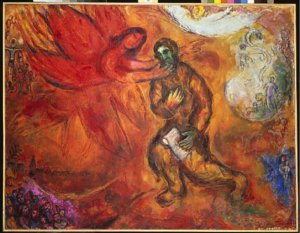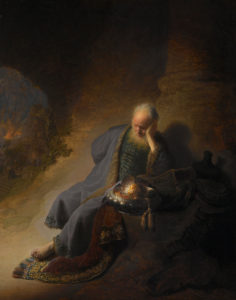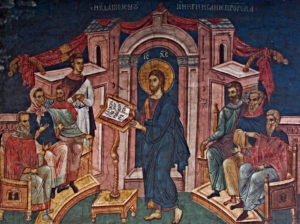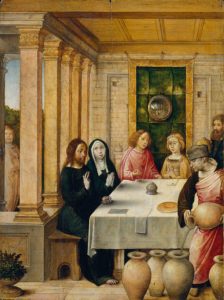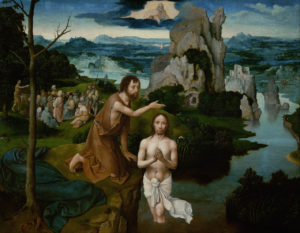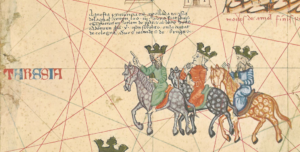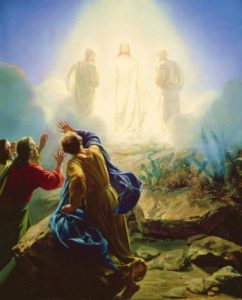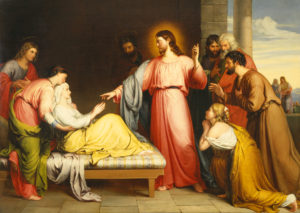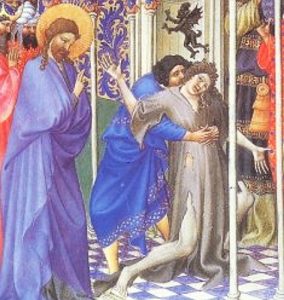Thoughts on Sunday’s Lessons for Feb. 17, 2019
First Reading: Jeremiah 17:5-10
Because the date of Easter varies, and with it the number of Sundays after the Epiphany, we get to hear Luke’s version of the Beatitudes only occasionally.
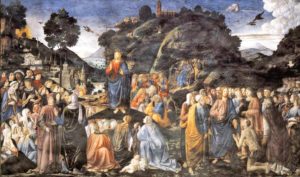
The Sermon on the Plain (1481-1482), fresco by Cosimo Rosselli (1439-1507). Northern wall of the Sistine Chapel, Vatican City. (Click image to enlarge.)
It appears in our Sunday readings only when Easter falls after the first week of April during the years when the Lectionary turns to Luke’s Gospel. Thus, this is our first time to hear it since 2007, and that’s too bad, as its contrasts with Matthew’s version of the Beatitudes gives us plenty to think about. Sunday’s other readings offer us similar food for thought. In our first reading, the Prophet Jeremiah separates the cursed – who turn from God to trust in mortals and must wither and die – from the blessed, those who trust in God and will be deeply rooted and nourished like plants near water.
Psalm: Psalm 1
Does the first of the 150 Psalms set a theme for the entire book of Psalms? Psalm 1 echoes the covenant that God gave to Moses, singing praise for righteousness and its rewards while warning about the dangers of following the ways of the wicked? Using metaphors that mirror precisely the words of Jeremiah in the first reading, the Psalmist promises delight for the righteous, who will thrive and bear fruit like trees planted near water. Not so for the wicked, the verses continue, who will be doomed like chaff that the wind blows away.
Second Reading: 1 Corinthians 15:12-20
We continue listening in as Paul works out his theology of our salvation through Christ’s resurrection in the closing chapters of First Corinthians. Remember that these letters were written at least a generation before Mark, the first of the Gospels. Paul’s words offer us a glimpse at the ideas evolving in an infant Christian community with a largely oral tradition of stories going back to the adult ministry of Jesus less than 20 years before. Here Paul challenges those who doubt that Christ’s resurrection means that we, too, are freed from the fear of death. If Christ was not raised, Paul says, then our faith has been in vain and our sins have not been forgiven. But in fact Christ was raised from the dead. He is the first fruit of all who die and will now live again.
Gospel: Luke 6:17-26
It is interesting to compare Matthew’s narrative of Jesus’s Sermon on the Mount with Luke’s account of the Sermon on the Plain. After having spent the night on a mountain in silent prayer, Jesus comes down to a level place and talks to his just-chosen disciples and a huge crowd of followers, not only from Galilee but throughout the region. Offering them a series of beatitudes, he adds a more edgy tone by following a series of blessings with a series of woes. Blessed are the poor (the actual poor, in contrast with Matthew’s “poor in spirit”); the hungry, those who weep and those who are reviled. But Luke shows Jesus also declaring woe at the rich, those who are full of food and wealth, those who laugh as they receive constant praise. This liberating preference for the poor and downtrodden is Luke’s subtext; we’ve already heard it in his stories of the Song of Mary and Jesus’ first sermon in his home town. This focus shows most strongly in Luke’s Gospel, and it continues all the way to the Cross.

